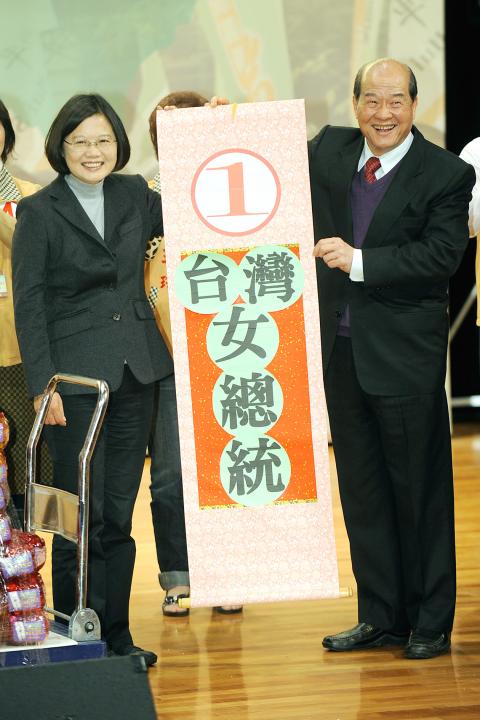Democratic Progressive Party (DPP) presidential candidate Tsai Ing-wen (蔡英文) yesterday received a boost as the Taiwan Solidarity Union (TSU) and a group of academics openly endorsed her bid.
In a speech at the TSU’s 10th anniversary celebration yesterday, Tsai said that during the DPP’s reforms over the past three years, the party has maintained close ties with the TSU and it has been a very enjoyable experience working with them.
Thanking the TSU for throwing its support behind her presidential campaign and the DPP’s legislative nominees, Tsai said she hoped the TSU would be able to pass the threshold required to earn a legislative seat and she looked forward to working with the TSU in the legislature.

Photo: Sean Chao, Taipei Times
Parties are required to receive 5 percent of the vote to nominate candidates for legislator-at-large seats.
Tsai said in her speech that the public was worried that a possible cross-strait peace accord mentioned by President Ma Ying-jeou (馬英九) would deprive the next generation of Taiwanese of a choice about their future, so the current generation should shoulder the responsibility.
“As such, the TSU and the DPP should work together even more closely and guard Taiwan,” she said.
On the nation’s economy, Tsai said the public needs an empathetic government that takes care of those who need help, not like the current government, which thought that every economic problem would be solved with the signing of the Economic Cooperation Framework Agreement (ECFA).
Former president Lee Teng-hui (李登輝), the TSU’s spiritual leader, did not attend the event as he is still recovering from surgery he underwent last month to have a tumor removed.
TSU Chairman Huang Kun-huei (黃昆輝) read a statement on Lee’s behalf, which called for voters to cast their ballots for Tsai for president, the DPP for legislators and the TSU for their party vote.
According to Huang, although the New Party and the People First Party split from the Chinese Nationalist Party (KMT), the current core mentality of KMT decisionmakers was the same “China Unification” path as the New Party, only with a different packaging to attract neutral voters.
“The KMT is using the New Party to make a show and make believe that the KMT is a party of a modest path,” he said.
At a separate setting yesterday, a group of academics, including several from Academia Sinica, formed an alliance in support of Tsai’s presidential bid.
Academia Sinica’s Lin Ming-chang (林明璋) served as honorary convener of the group, while Taiwan Association of University Professors president Chang Yen-hsien (張炎憲) served as the official convener.
Expressing her gratitude, Tsai said that being an Academia Sinica academic was once her dream.
“I am overcome with gratitude and a sense of responsibility today seeing so many academics and scholars show up to support my campaign, “ she said.
Translated by Jake Chung, Staff writer

A car bomb killed a senior Russian general in southern Moscow yesterday morning, the latest high-profile army figure to be blown up in a blast that came just hours after Russian and Ukrainian delegates held separate talks in Miami on a plan to end the war. Kyiv has not commented on the incident, but Russian investigators said they were probing whether the blast was “linked” to “Ukrainian special forces.” The attack was similar to other assassinations of generals and pro-war figures that have either been claimed, or are widely believed to have been orchestrated, by Ukraine. Russian Lieutenant General Fanil Sarvarov, 56, head

A magnitude 7.0 earthquake struck off Yilan at 11:05pm yesterday, the Central Weather Administration (CWA) said. The epicenter was located at sea, about 32.3km east of Yilan County Hall, at a depth of 72.8km, CWA data showed There were no immediate reports of damage. The intensity of the quake, which gauges the actual effect of a seismic event, measured 4 in Yilan County area on Taiwan’s seven-tier intensity scale, the data showed. It measured 4 in other parts of eastern, northern and central Taiwan as well as Tainan, and 3 in Kaohsiung and Pingtung County, and 2 in Lienchiang and Penghu counties and 1

SAFETY FIRST: Double the number of police were deployed at the Taipei Marathon, while other cities released plans to bolster public event safety Authorities across Taiwan have stepped up security measures ahead of Christmas and New Year events, following a knife and smoke bomb attack in Taipei on Friday that left four people dead and 11 injured. In a bid to prevent potential copycat incidents, police deployments have been expanded for large gatherings, transport hubs, and other crowded public spaces, according to official statements from police and city authorities. Taipei Mayor Chiang Wan-an (蔣萬安) said the city has “comprehensively raised security readiness” in crowded areas, increased police deployments with armed officers, and intensified patrols during weekends and nighttime hours. For large-scale events, security checkpoints and explosives

‘POLITICAL GAME’: DPP lawmakers said the motion would not meet the legislative threshold needed, and accused the KMT and the TPP of trivializing the Constitution The Legislative Yuan yesterday approved a motion to initiate impeachment proceedings against President William Lai (賴清德), saying he had undermined Taiwan’s constitutional order and democracy. The motion was approved 61-50 by lawmakers from the main opposition Chinese Nationalist Party (KMT) and the smaller Taiwan People’s Party (TPP), who together hold a legislative majority. Under the motion, a roll call vote for impeachment would be held on May 19 next year, after various hearings are held and Lai is given the chance to defend himself. The move came after Lai on Monday last week did not promulgate an amendment passed by the legislature that